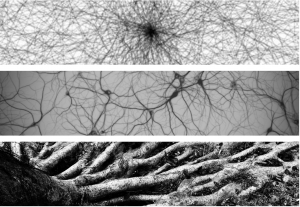
- This event has passed.
Posthumanist Ecocriticism Postgraduate Summer School
July 23, 2019 - July 24, 2019
Event Navigation

This summer school will investigate methods to communicate complex environmental objects such as climate change, habitation, or the human body as a structurally open spaces inhabited by microscopic life forms in competition or symbiosis with non living objects. In addition, nano processes are being offered as solutions for large-scale geoengineering of the planet for climate mitigation, such as nano-particles to reduce the Earth’s albedo, and the use of nano tech in human enhancement discourses. We will engage with the ideological load of popular narratives, such as right-wing cultures of preparation (i.e. providing a historical perspective of why people build shelters, bunkers and other provisional escape places), religiously motivated discourses of separation or cohabitation with other species (transcorporeality), or the effects of hygiene management on forms of habitation.
Framing environmental objects poses extreme narrative challenges with regard to scale, for example, in the case of large objects such as climate change, its unboundedness, incalculability, and unthinkability, but also, at microscopic level, in the case of thinking the human as a the community of other life forms. In both cases actions are required that exceed the scale in which we are used to operate, at institutional, infrastructural, interpersonal and organisational level.
Part of this ongoing and pressing task is to abstain from imposing worn out labels onto this delicate process of conceiving environmental continuities of texts, beings and ecosystems, which might in an underhanded way continue to inscribe traditional divisions and impositions. Instead, it is calling forth forms of organisation without any precedent.
The recent posthumanist turn in ecocriticism, we believe, must proceed phenomenologically, recognizing the constructedness of divisions within the compound continuum of life on earth, their arbitrariness and the task of this generation as well as future generations to understand the constructedness of these divisions and search for viable alternatives. Constructivisms of all kinds have been and continue to be accompanied by a complementary yearning for authenticity, the real and the material.
In recent years, various strands of theoretical thinking categorised as ecocritical have challenged both the irrefutability and the frustration mentioned above from new perspectives. Taking their cue from innovative literary attempts to imagine, depict and conceptualise the human-nature relationship and the place of human beings in a world under threat, in this summer school we will take issue with the assumed omnipotence of social constructionism. The purpose of this workshop is to ask if there is an alternative to resignation in the face of this perceived inescapability without resorting to a naive insistence on the relevance of ‘the real’. Obviously, an intellectual climate, dominated by suspicion of the very idea of nature outside quotation marks is not conducive to a vigorous engagement with the problem. On the other hand, Timothy Morton in “Ecology without Nature” made a convincing case for why the term “nature” needs to be abolished due to its ideological load as a “respite place” that enables us to tolerate modes of destruction. Acknowledging this, in this workshop we will explore new ways to talk meaningfully about the gap between language and the world.
Some of the areas that will be addressed are:
- The world of population and climate crises exceeds the usual operational scales of political action, at the institutional, infrastructural, interpersonal and organisational levels, from the nano to the ‘hyperobject’ (Timothy Morton). Can we use ecocriticism to face the Open, regardless of how and where we live?
- What are the sources of ideological inspiration for subcultures that are developing in the face of ecological collapse? What are the cultural and legal-political sources of the belief systems of ‘preppers’ (i.e. people making emergency preparations in the face of climate apocalypse), or of religiously motivated discourses of separation or cohabitation with other species?
- The posthuman turn involves ‘rethinking the conceptual frameworks within which we have defined human subjectivity, agency, identity, and self, acknowledging the permeable boundaries of species in the natural-cultural continuum’ (Oppermann 2016, 275).
Programme: Posthumanist Ecocriticism Summerschool 23.-24. July 2019
Day 1: 2pm-4.30pm, Bridge Room Hardiman Building 1001
| Community Matters
|
|
| Ashley Cahillane | Embodying the Water Crisis: Environmental Justice and the Fate of California’s Water in Claire Vaye Watkins’ Gold Fame Citrus |
| Niamh Donnellan | Dismantling Hegemonic Temporality to Aid Environment Justice
|
| Zania Koppe | Living Differently on the Edges
|
| Roundtable Discussion | Transcorporal Communities: Cohabitation with Other Species on a Warming Planet
(chaired by Tina-Karen Pusse) |
Day 2: 10am-1pm, Bridge Room Hardiman Building 1001
| Between Utopia and Dystopia: Posthuman Scenarios and Modes of Subjectivity
|
|
| Daniel Mazurek
|
Cyberpunk as Postanthropocentric Narrative |
| Andreas Weidlich | Resurrection from Ruins: Horizon Zero Dawn and the Production of Social Spaces |
| Simone Klapper | Between Intrusion & Interconnection – The Parasite as a Figure of Interspecific Relational Subjectivity in Contemporary Literature and Film |
| Maria Quigley | Fungus, Futurity, and the Fall of Humanity in M. R. Carey’s The Girl with all the Gifts |
Break
Keynote Presentation: 2pm, Hardiman Building Moore Seminar Room GO10
| Heike Schwarz | Disaster Impending Somewhere: EcoGothic, EcoHorror and Posthumanist Ecocriticism.
|

